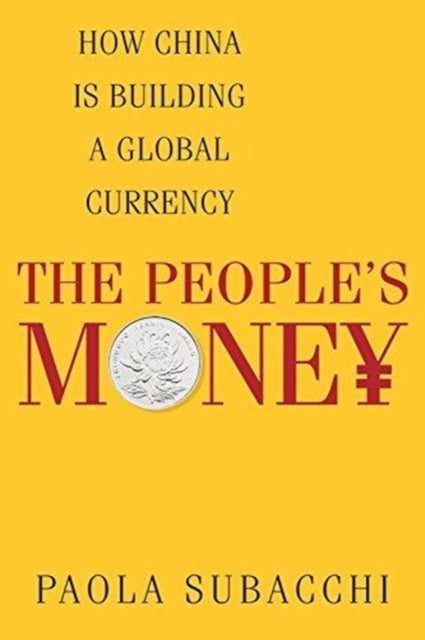Paola Subacchi
People's Money: How China Is Building a Global Currency
People's Money: How China Is Building a Global Currency
YOU SAVE £4.20
- Condition: Brand new
- UK Delivery times: Usually arrives within 2 - 3 working days
- UK Shipping: Fee starts at £2.39. Subject to product weight & dimension
Bulk ordering. Want 15 or more copies? Get a personalised quote and bigger discounts. Learn more about bulk orders.
Couldn't load pickup availability
- More about People's Money: How China Is Building a Global Currency
China's renminbi has lagged behind major currencies due to economic policies that prioritize development over growth. Strengthening the currency without losing control of the economy or risking collapse is a daunting task for China's leaders. Paola Subacchi's book "The People's Money" explores China's monetary system and the challenges of increasing its international circulation.
Format: Paperback / softback
Length: 256 pages
Publication date: 10 April 2018
Publisher: Columbia University Press
China has long favored economic policies that have prioritized development over the growth of its currency, the renminbi. This has led to the renminbi lagging significantly behind other major international currencies such as the pound, euro, and dollar in global circulation. The underpowered currency poses a significant threat to China's future.
The nation's leaders now face the challenging task of strengthening the currency without losing control of the nation's economy or risking a total collapse. How are they approaching this challenge?
In her book, The People's Money, Paola Subacchi provides a comprehensive exploration of China's monetary system, tracing its evolution over the past century and, particularly, its transformation since Deng Xiaoping took power in 1978. Subacchi delves into the policies that fostered China's economic rise while simultaneously creating a currency with limited use beyond its borders. She argues that understanding China's economic predicament lies in examining both its past and future strategies for the renminbi.
The financial turbulence following the global crisis of 2008, coupled with China's aspirations as a global creditor and chief economic power, has compelled the nation to confront the limitations of the renminbi's international circulation. Increasing the currency's reach will play a crucial role in securing China's future.
To strengthen the renminbi, China has implemented a series of measures, including allowing it to float more freely against the dollar and other currencies. The country has also expanded its foreign exchange reserves, which are used to support the currency and maintain its stability. Additionally, China has encouraged the use of the renminbi in international trade and investment, promoting its global acceptance.
However, strengthening the renminbi is not without its challenges. One of the main concerns is the potential impact on China's domestic economy, particularly its exports. A stronger renminbi could make Chinese goods more expensive, which could hurt the country's competitiveness in the global market. Additionally, a stronger currency could lead to inflation, which could undermine the government's efforts to control economic growth.
Another challenge is the political aspect of currency reform. China's leaders must balance the need for economic stability with the demands of domestic political constituencies. Any changes to the currency's exchange rate or valuation could have significant social and political consequences, particularly in regions where the economy is struggling.
Despite these challenges, China remains committed to strengthening the renminbi. The country recognizes that a stronger currency is essential for its long-term economic growth and global competitiveness. China's leaders are aware that they must navigate a delicate balance between economic stability and political considerations to achieve their goals.
In conclusion, China's renminbi has lagged behind other major international currencies due to the country's prioritization of economic development over the currency's growth. The underpowered currency poses a significant threat to China's future, and the nation's leaders must navigate a complex set of challenges to strengthen it without losing control of the nation's economy or risking a total collapse. By implementing measures such as allowing the renminbi to float more freely, expanding foreign exchange reserves, and promoting its use in international trade and investment, China is taking steps to increase the currency's reach and secure its future. However, the process is complex and requires careful consideration of economic, political, and social factors.
Weight: 326g
Dimension: 223 x 141 x 17 (mm)
ISBN-13: 9780231173476
This item can be found in:
UK and International shipping information
UK and International shipping information
UK Delivery and returns information:
- Delivery within 2 - 3 days when ordering in the UK.
- Shipping fee for UK customers from £2.39. Fully tracked shipping service available.
- Returns policy: Return within 30 days of receipt for full refund.
International deliveries:
Shulph Ink now ships to Australia, Belgium, Canada, France, Germany, Ireland, Italy, India, Luxembourg Saudi Arabia, Singapore, Spain, Netherlands, New Zealand, United Arab Emirates, United States of America.
- Delivery times: within 5 - 10 days for international orders.
- Shipping fee: charges vary for overseas orders. Only tracked services are available for most international orders. Some countries have untracked shipping options.
- Customs charges: If ordering to addresses outside the United Kingdom, you may or may not incur additional customs and duties fees during local delivery.


